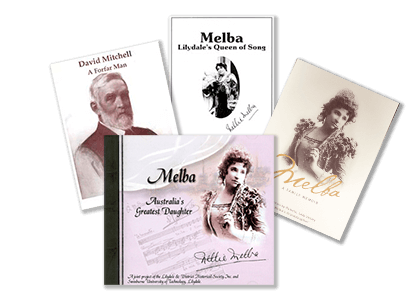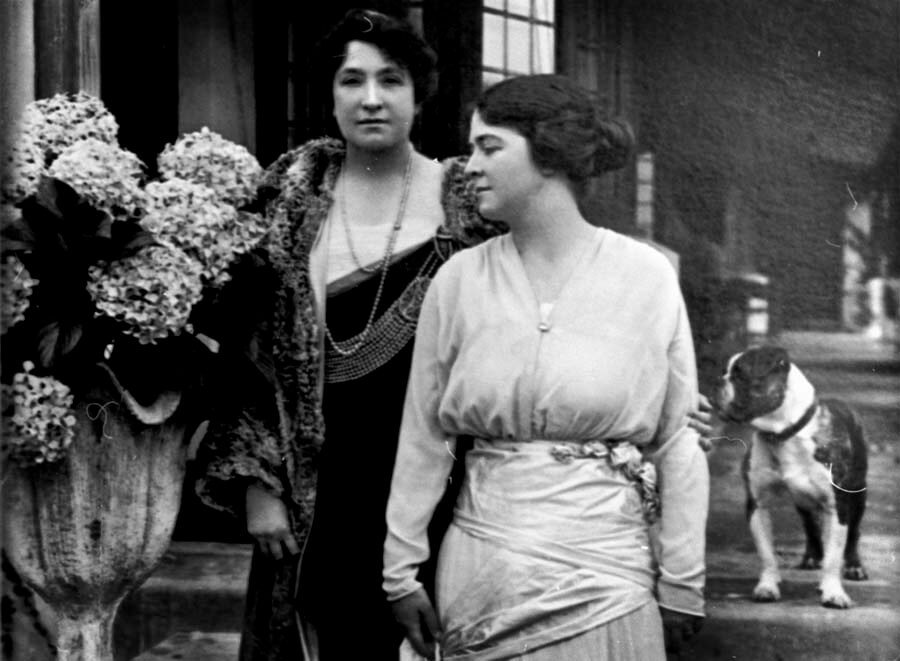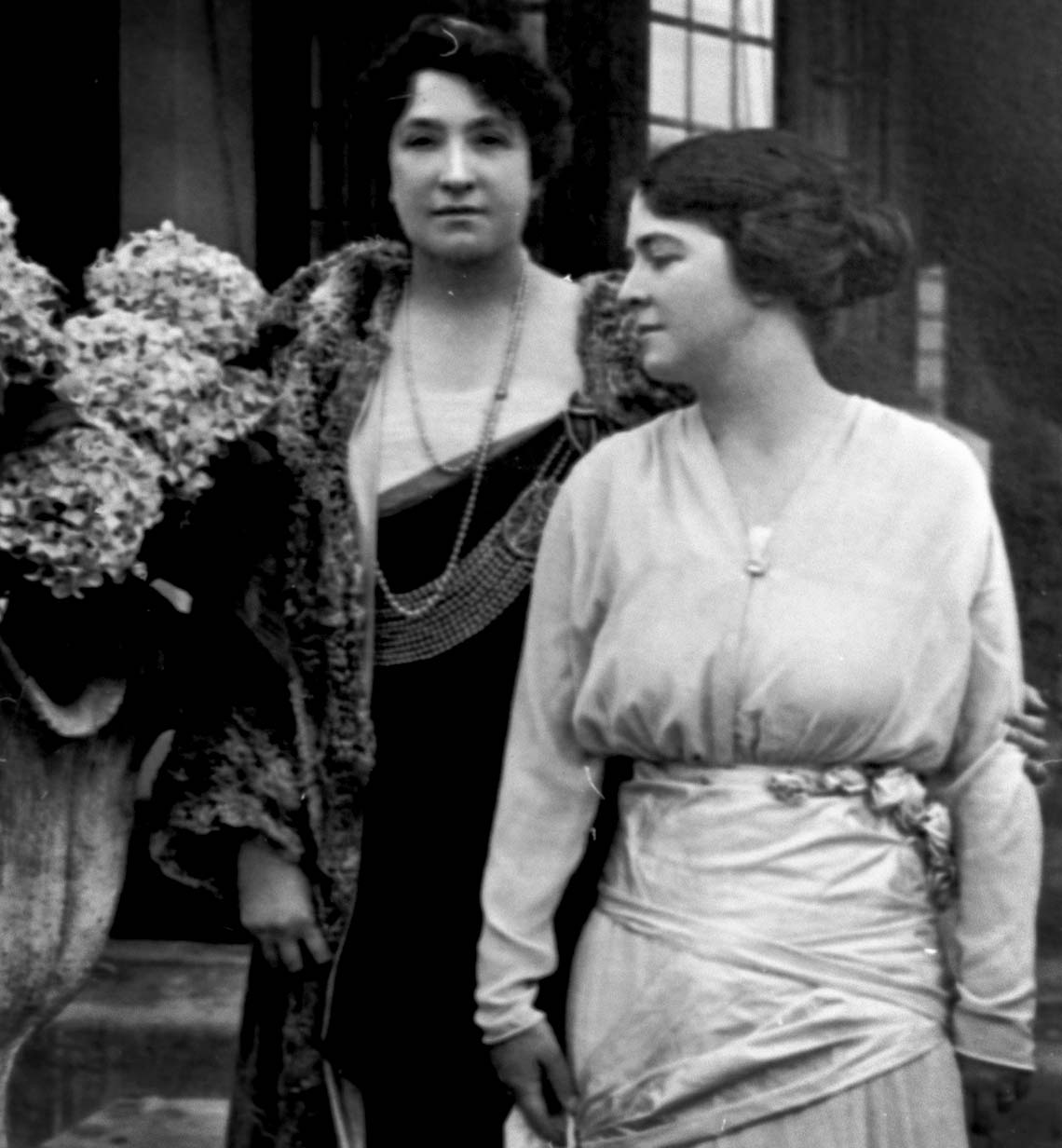
Biography | Triumph and Scandal
Eighteen ninety-one was a critical time in Melba’s life. After the triumph in Russia she returned to the Paris Opera whose audience had now claimed her as their own.
Melba may have made her debut in Brussels but she now lived in Paris and was seen as a typical Parisian. (1)
The Paris Opera again presented Melba with the silver medal of the Paris Conservatoire. (2)

Moves for an American tour
The Americans were trying to sign her to a contract for a season of opera. As early as January 1891, the American press reported impresario Henry E. Abbey had engaged the de Reszke brothers, Marie Van Zandt and Melba for a season of Italian opera at the Metropolitan Opera House. (3)
In April the Los Angeles Times reported Col. Mapleson was trying to secure Melba for an American tour and that $150,000 for two seasons had been offered as an inducement. (4)
However, her personal life had reached crisis point. Melba continued to be seen with the Duc d’Orleans and the couple were not very discrete. They were seen together at the opera in Vienna and in Paris and it created a scandal.
By now the rift between Melba and Charles was irreconcilable.
“Nellie was flattered to have such a princely escort and the prince was openly delighted with the singer whose voice had so enchanted him. There was a compatibility between these two lonely people, respect and sympathy grew and was to turn into a precious and lasting friendship. The two had not really thought about all the aspects of their affair.” (5)
Charles had had enough and was determined to get a divorce so he could get custody of George and raise him as the son of an Englishman. He did not think about the impact his actions would have so he filed for divorce on the grounds of adultery and named the Duc d’Orleans in the petition.
The Orleans family were desperate to avoid a scandal which could affect their claim to the French throne. For Nellie the divorce action would badly damage her career and she would possibly lose George.
Despite her personal turmoil, Melba finished the Paris season and went back to Covent Garden.
A busy season. Her first appearance of the season was on June 3 at Juliet in Gounod’s Romeo et Juliette. The Times critic wrote:
“Her performance is so familiar that comment on it would be superfluous; it must suffice to record that Mme. Melba was in excellent voice and that her singing is as finished as ever.” (6)
Melba was back on stage June 5 as Gilda in Verdi’s Rigoletto. Her singing was judged as ‘beyond praise’ with her delivery of Caro nome as “brilliant”. (7)
Melba’s program for the season highlights the workload of the opera stars of the time:
June 15 – Romeo et Juliette; (8)
June 18 –Rigoletto. (9)
June 27 – Melba’s only concert appearance at the Royal Albert Hall as part of Augustus Harris’ Second grand morning operatic concert. (10)
July 4 – Melba appeared in Carmen in the role of Michaela while Zelie d Lussan played Carmen and the cast included the de Reszke brothers. This was the first time Melba has sung the role in England. (11)
Melba’s other appearances during the season were:
July 6 – Lucia di Lammermoor (12)
July 8 – By command of Queen Victoria, Melba appeared at the Command Performance The State Concert for the visiting Emperor and Empress of Germany. Melba sang the duet de Palnette with Jean de Reszke. (13)
July 21 – Final appearance for the season in Romeo et Juliette;
July 24 -Melba was one of the singers at a State Concert held at Buckingham Palace on July 24, 1891.
July 27 – Melba’s last appearance for the season was as Elsa in Lohengrin with Jean de Reszke. (14)
Facing the courts
The season over, Melba returned to Paris but the turmoil in her personal life continued.
By the end of 1891, Charles has filed for divorce and the impending action soon caught the eye of the media. On November 15, 1891, The New York Times published a report from London stating that Melba sang well at the Paris Opera and then went to London to attend to her divorce suit before heading to America. (15)
By early in 1892, The Times was reporting the case which it labelled the Melba divorce case and it was followed with interest as both parties tried to out manoeuvre each other with claims and injunctions. The Duc claimed the court had no jurisdiction in the case as he wasn’t living in Britain.
The separate actions went as far as the British Court of Appeal and finally, cooler heads prevailed and the matter was quietly dropped.
Palermo and Nice
Putting her personal difficulties aside Melba was facing a busy 1892, as she was to travel to America to appear at the Metropolitan Opera House for Henry Abbey and Maurice Grau. In the spring she travelled to Palermo in Sicily where she appeared in La Traviata at the Opera House at Palermo. (16)
Staying next door to her in the hotel was the Italian musician Guetano Braga who woke her up playing the Serenata of Braga on a violincello. After calling out to each other, they arranged to meet the next day. (17)
He added his signature to the many already in Melba’s autograph book.
During this season, Melba also sang at the Argentine Theatre in Rome appearing in Lucia di Lammermoor.
Soon after her return to Paris, Melba was greeted with the news the Metropolitan Opera House had burnt down. The fire started at 9am on August 27, 1892 and only the walls of the stage were left standing. The extimated loss was about $100,000. (18)
“Henry Abbey and Maurice Grau came and told me that as there had been no clause in my contract concerning the question of delay, I should be legally justified in demanding the whole of my salary. I told them that as I hadn’t sung, I didn’t expect to be paid. They looked relieved.” (19)
However, Melba was in a quandary as she only had £200 in the bank and no engagements.
Determined to put on the best possible face, she hired two maids and headed to Nice on holiday but was hoping for an engagement or two.

She met Maurice Grau who offered her the chance to sing for the season. Melba stayed and was paid 5000 francs a night. (20)
During the Nice season, Melba had another win when her beautifully decorated car won first prize in the Battle of Flowers.
“Her artistic taste and original ideas were well illustrated in the colouring and design of the ornamental scheme. The Prince and Princess of Monaco were the first to congratulate her on her victory.” (21)
That evening she sang Lucia di Lammermoor at the Nice Opera House.
World premier of Elaine

A successful Paris season was followed by the Covent Garden season, again the scene of several Melba firsts.
Composer Hermann Bemberg, whose mother was a close friend of Melba, composed an opera dedicated to Melba and Jean de Reszke.
His opera Elaine had its world premiere at Covent Garden on July 5, 1892.
The Times reviewed the opera and the cast:
“Seldom has a new opera being sung by so fine a group of singers, at least in England. Mme. Melba sings the part of Elaine with very great charm of style and perfection of vocalizations, and acts with becoming simplicity. Her delivery of the death-song last night was quite faultless.”
The cast received several curtain calls at the end of the opera. (22)

Melba also sang at a concert at Buckingham Palace on July 1 in the presence of the King of Romania and Prince Ferdinand of Rumania. Before the end of the season Melba had appeared in two special extra performances of Faust, Romeo et Juliette and Lohengrin.
Tired, Melba went for a rest in Aix France in August and after several continental engagements, she returned for the autumn season at Covent Garden.
For the first time, Melba appeared in Aida during the autumn season on November 4, 1892. To prepare for the role, Melba enlisted the assistance of Paolo Tosti.

According to The Times, the role requires a voice of dramatic calibre as in parts anything but an exceptionally powerful voice is drowned out by the ensemble.
The writer noted Melba sang
“with all her wonted beauty of style, and endeavoured in a very praiseworthy manner to realize the dramatic side of the part.” (23)
While the writers were critical of Melba’s voice for the Wagnerian Lohengrin during the spring season, by autumn they wrote she had perfected the role.
After just four days of preparation, again with Tosti, Melba sang Desdemona in Otello on November 23, 1892.
With such little preparation Melba missed certain points and usually reliable memory failed her for a few bars in the ensemble of the third act. (24)
At the end of the year, Melba was present to share in the celebration of the professional golden jubilee of Marietta Alboni. The artists from the Paris Opera performed followed by the actors and actresses from the Théàtre Français. (25)
It was the end of a couple of triumphant years professionally but Melba’s personal and family life was still unresolved. Not easily deterred, Melba started planning the following year, which according to Pamela Vestey established a pattern in her life as Melba could now choose what she wanted to do.
“There were new roles to learn, rehearsals, French lessons, and of course, visits to her dressmaker. She began to arrange concert tours before and after the opera season, and this was to be the pattern of her life for many years to come.” (26)
Eighteen ninety-three started with a concert tour of England and Scotland in January and February followed by that toughest of all opera houses: La Scala at Milan. Her first tour to America was also being planned.
References
(1) A. Murphy, Melba: A Biography, Doubleday, Page & Co, New York, 1909, pg 63.
(2) Op. cit. pg 63.
(3) New York Times, January 16, 1891.
(4) Los Angeles Times, April 20, 1891, pg 4.
(5) P. Vestey, Melba: A Family Memoir, Pamela Vestey, Coldstream, Melbourne 2000, pg 72.
(6) The Times London, June 3, 1891, pg 5.
(7) The Times London, June 8, 1891, pg 13.
(8) The Times London, June 18, 1891, pg 8.
(9) The Times London, June 18, 1891, pg 8.
(10) The Times London, June 26 1891, pg 1.
(11) The Times London, July 4, 1891, pg 10.
(12) The Times London, July 4, pg 10.
(13) The Times London, July 9, 1891, pg 10.
(14) The Times London, July 25, pg1.
(15) New York Times, New York, NY times November 15, 1891.
(16) N. Melba, Melodies and Memories, Thornton Butterworth Ltd, London, 1925, pg 107.
(17) N. Melba, op. cit, pg 108.
(18) New York Times New York, August 28, 1892 pg 1.
(19) N. Melba, op. cit., pg 108-109.
(20) N. Melba, op. cit., pg 109.
(21) A. Murphy, op. cit., pg 66.
(22) The Times London, July 06, 1892, pg 9.
(23) The Times London, November 7, 1892 pg 12.
(24) A. Murphy, op. cit., pg 72.
(25) M. Marchesi, Marchesi and Music Passages From The Life Of A Famous Singing Teacher, Harper & Brothers Publishers, New York, 1892, pg 283. (26) P. Vestey, op. cit., pg78.
Online Shop
Purchase books, CDs, photographs and other merchandise



Share Your Information with the Museum!
Email us your info (and images) to:
[email protected]
Our home is the Old Lilydale Court House:
61 Castella Street, Lilydale 3140
Hours of opening:
By appointment only:
Fridays 1 to 4pm and Saturdays to Mondays 11am to 4pm.
Sundays are preferred.
Closed Public Holidays

Nellie Melba Museum
Contact Details:
Sue Thompson: 0475 219 884
Email: [email protected]
Share your info with us:
[email protected]
Our home is the Old Lilydale Court House:
61 Castella Street, Lilydale 3140
Hours of opening:
By Appointment only:
Fridays 1 to 4pm and Saturdays to Mondays 11am to 4pm.
Sundays are preferred.
Closed Public Holidays

Nellie Melba Museum
Contact Details:
Sue Thompson: 0475 219 884
[email protected]
Nellie Melba Museum
Contact Details:
Sue Thompson: 0475 219 884
[email protected]
Our home is the Old Lilydale Court House:
61 Castella Street, Lilydale 3140
Hours of opening:
By appointment only:
Fridays 1 to 4pm and Saturdays to Mondays 11am to 4pm.
Sundays are preferred.
Closed Public Holidays
Share Your Information
with Nellie Melba Museum!
Sue Thompson: 0475 219 884
[email protected]

